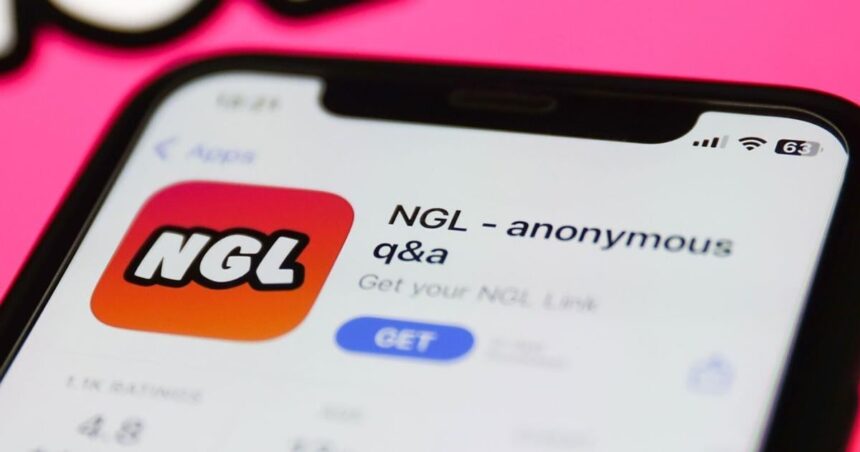WASHINGTON — The Federal Trade Commission and the Los Angeles District Attorney’s Office have banned a controversial anonymous messaging app from serving kids under 18, taking an unprecedented and aggressive step against what regulators called “rampant cyberbullying and threats against children and teens” on the platform.
The targeted ban is the FTC’s latest move in a wider crackdown on social media companies, data brokers and other businesses that allegedly mishandle consumer data or make overhyped claims about artificial intelligence.
As part of a lawsuit and settlement announced Tuesday, the app being penalized — known as NGL — will also pay $5 million to settle what FTC Chair Lina Khan said was “reckless disregard for kids’ safety.” The app will also have to implement an age gate to block its services to current and new users who are under 18 years old. The regulators wrote that the app billed itself as a “safe space” for teens but, in reality, preyed on them.
People are also reading…
The NGL app is displayed on a phone screen in this illustration photo taken in Krakow, Poland on January 19, 2023.
In addition to highlighting FTC follow-through on earlier promises to police AI hype, the lawsuit directly names the company’s co-founders, reflecting recent agency commitments to holding individual executives accountable for corporate wrongdoing.
The app, known as NGL, had been downloaded millions of times, according to the complaint. NGL is an internet abbreviation for “not gonna lie.”
NGL actively marketed itself to young users and violated federal laws aimed at protecting children’s data, the lawsuit claimed, while its employees allegedly mocked paying users as “suckers” while profiting from their ignorance.
In a statement, NGL co-founder Joao Figueiredo said the company had spent nearly two years cooperating with the FTC’s investigation but that it disputes the agency’s findings, which were approved unanimously by the five-member commission.
NGL responds
“We view this resolution as an opportunity to make NGL better than ever for our users and we think the agreement is in our best interest,” Figueiredo said. “While we believe many of the allegations around the youth of our user base are factually incorrect, we anticipate that the agreed upon age-gating and other procedures will now provide direction for others in our space, and hopefully improve policies generally.”
The settlement must still be approved by the U.S. District Court for the Central District of California before taking effect.
NGL deceptively hooked teens into subscribing to its premium service by sending them fake, anonymous messages and then promising to reveal the sender after they paid, said the complaint.
The computer-generated messages were purposely written to prey on teens’ social anxieties or aspirations, the lawsuit said, citing examples such as “I know what you did” and “I’ve had a crush on you for years.”
NGL created more than 1,000 different such messages posing as real users and sent them millions of times to persuade teens to pay to see who sent them, the complaint said. But when users paid for information about both the fake and the real messages, sometimes as much as $9.99 a week, the app didn’t show the sender’s name but instead provided “hints” such as the user’s rough location or the type of device being used, according to the lawsuit.
The messages started being sent in 2022, a year after the app’s lackluster launch, the complaint said. After users began suspecting the fake messages, many wrote negative reviews of the app and some even called it a scam, according to the lawsuit.
NGL had allegedly boasted in its marketing that the app was a “safe space for teens” and that it used AI-based content moderation to protect users. Behind the scenes, however, the app’s co-founders allegedly ignored or denigrated users who complained, with Figueiredo responding “lol” in an internal message to a report about one upset customer, according to the lawsuit.
The lawsuit and settlement are another example of how Khan, a vocal critic of the tech industry, has made regulating digital data a hallmark of her tenure.
In addition to warning that generative artificial intelligence may “turbocharge” fraud and scams, Khan has proposed multiple regulations that would clamp down on how businesses may collect, use and share consumer data. One would crack down on what she calls a “commercial surveillance” industry, while another seeks to expand the FTC’s enforcement of a landmark children’s privacy law.
The FTC is also currently seeking to prohibit Meta from monetizing children’s data, a move that company has challenged in court. In 2022, the FTC forced Epic Games, maker of the hit video game “Fortnite,” to pay $520 million to settle allegations that it used sneaky user-interface tricks known as “dark patterns” to dupe users into making in-game purchases.
Rising ire from regulators
The FTC move comes against the backdrop of a flurry of state legislation seeking to limit young people’s access to social media. In another first this year, New York approved legislation that regulates the algorithms powering social media feeds on Facebook, Instagram, TikTok and other apps. States such as Arkansas, Florida, Louisiana and many others have also passed laws clamping down on social media companies’ approach to teens. Opponents, however, say the laws violate the First Amendment rights of teens and the Supreme Court has agreed to consider the constitutionality of age-based website restrictions in its next term.
Highlighting the groundbreaking nature of the NGL settlement, FTC Commissioner Andrew Ferguson described Tuesday’s action as a “novel” use of the agency’s legal powers. For the first time, he said in a statement, the FTC claimed that NGL broke the law “by marketing an anonymous messaging app to children and teenagers despite knowing that anonymous messaging apps are harmful to these groups.”
“This alleged conduct, tailormade to manipulate the vulnerable teenage psyche, was reprehensible and unfair,” Ferguson said. But, he argued, the public should not interpret the lawsuit to mean that it is illegal in general to market any anonymous messaging app to teens.
On Tuesday, the FTC credited the consumer advocacy group Fairplay and the social media critic Kristin Bride for “invaluable assistance” on the NGL investigation. Last year, Bride testified before Congress in a high-profile hearing about social media’s risks for teens, recounting how her teenage son Carson died by suicide in 2020 after receiving a barrage of anonymous cyberbullying messages. In October, Bride and Fairplay





